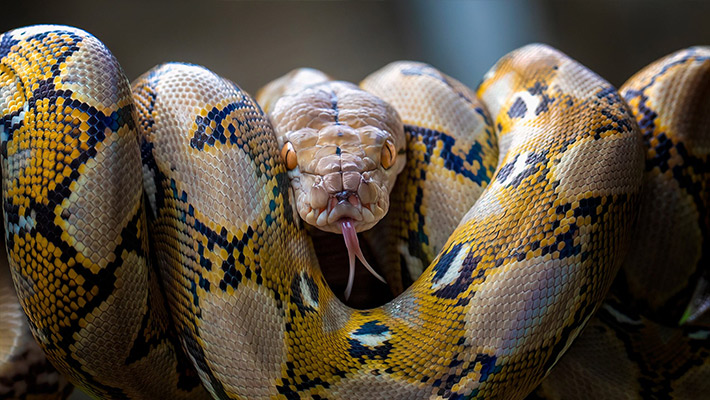Learn about the Reticulated Python
Scientific name: Malayopython reticulatus
Conservation status: Least concern
Environmental Threats: Habitat destruction – deforestation. Overexploitation for its skin, medicine & pet trade. Climate Change.
Lifespan: Wild = unknown. Captivity = 23 to 29yrs.
Reproduction: 88 Days incubation. 15 and 80 eggs per clutch.
Care for Young: Hatchlings – juveniles are fully self-sufficient.
Size: 1.5m up to 10m long
Weight: up to 75kg
Patterned Perfection
A part of their scientific name, ‘reticulatus’ translates to mean ‘net-like’, a reference to their complex colour pattern. In a shadowy jungle environment, amid fallen leaves and debris, the python’s scaled pattern allows them to virtually disappear. Called disruptive colouration, it protects them from predators and helps them to catch their prey.
Snake...will swim
It is easier for a large snake to move in water rather than land and Reticulated Pythons are excellent swimmers. Sightings of these lengthy reptiles have been recorded far out at sea and has consequently colonised many small islands within its Southeast Asian distribution range.
Hey Mumma!
Like most pythons, the Reticulated Python is oviparous meaning it lays eggs. Unlike most snakes, the Reticulated Python female remains coiled above the incubating eggs to provide warmth for them. She will ‘shiver’ her body to create warmth.
Surprise...Say squeeze
Reticulated Pythons are solitary creatures and are active throughout the night. Ambush hunters, using their excellent camouflage, waiting until prey wanders within striking range before seizing it in their coils and killing it by constriction. These giants of the snake world are often found near human habitation where they play a useful role in keeping the rodent numbers under control.
Get a grip
While their size makes them slow movers, they can still strike at lightning-fast speeds. Like all pythons, Reticulated Pythons are non-venomous, but their backward curved teeth help to grip and grab their prey like a fork. The python then wraps around the prey, applying extreme pressure to its circulatory system. Their blood vessels begin to shut down almost immediately, restricting blood flow and oxygen to the vital organs, including the brain and heart.
